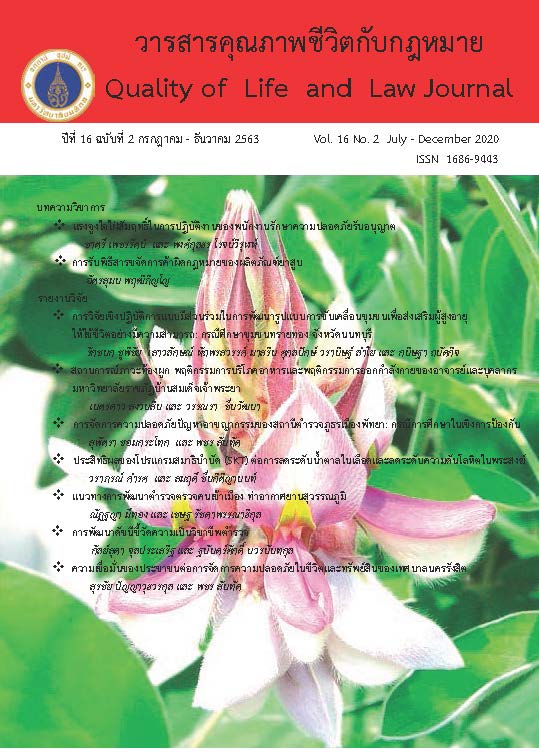The Development Of The Police Professionalism Indicators
Main Article Content
Abstract
This research aimed at finding the police’s professionalism indicators according to the professional guidelines of the Royal Thai Police in the Provincial Police Region 1-9. This is a qualitative research design employing in-depth interview with the 25 professional officers who is commissioned police officer starting from the level of police colonel working in the Provincial Police Region 1-9 for a period of not less than 17 years with knowledge and experience. The Delphi Technique is used in this research to find the consensus of the consistent opinions in 4 rounds. The statistic are used to analyse namely mean median mode.
The study found that the opinion’s professional conforms to the police’s professionalism in all issues create the police’s professionalism indicators which is divided in 6 sides with 37 indicators in detail leading to professional police
The suggestion from this research recommend that police academic and police training institute should implement 37 indicators of the police’s professionalism in the police syllabus in order to develop and prepare police officer for duty as professional police.
Article Details
- บทความหรือข้อคิดเห็นใดๆ ในวารสารคุณภาพชีวิตกับกฎหมายเป็
- กองบรรณาธิการไม่สงวนสิทธิ์
References
กองบัญชาการศึกษา สำนักงานตำรวจแห่งชาติ. (2558). แนวทางสำหรับผู้บังคับบัญชาในการประชุมชี้แจงให้กับข้าราชการตำรวจเพื่อปรับทัศนคติที่ดีในการให้บริการต่อประชาชนและการปฏิบัติการข่าวสาร. Retrieved from http://www.edupol.org/eduOrganize/publicDoc/manual/commander/01.pdf
กองบัญชาการศึกษา สำนักงานตำรวจแห่งชาติ. (2561). คู่มือยุทธวิธีตำรวจสำหรับครูฝึก. Retrieved from http://www.edupol.org/eduOrganize/publicDoc/manual/training/01.pdf
กัลยา พรหมวัชรานนท์ และ พรรษกร ชาตรีภิญโญ (2561). การวิเคราะห์ปัญหาและความต้องการในการใช้ภาษาอังกฤษเพื่อการสื่อสาร เพื่อพัฒนาชุดสื่อการเรียนรู้ด้วยตนเองสำหรับตำรวจจราจรในภาคเหนือตอนบน. Retrieved from https://so01.tcithaijo.org/index.php/HUSO/article/view/123552
ธาดา รัชกิจ (2563). การบริหารจัดการคนเก่งในองค์กร. Retrieved from th.hrnote.asia/ orgdevelopment/190114-th-talentmanagement/
ยุทธศาสตร์สำนักงานตำรวจแห่งชาติ(2561). สำนักงานตำรวจแห่งชาติ
ปรีดา สถาพร (2562).การทำงานของตำรวจยุคดิจิทัล ด้วยเทคโนโลยียุคใหม่. Retrieved from http://preeda44.blogspot.com/2019/04/blog-post.html
Bostrom, M. D. (2005). The influence of higher education on police officer work habits. Police Chief,72(10).
Carlan, P. E., & Lewis, J. A. (2009) Dissecting police professionalism: A comparison of predictors within five professionalism subsets Police Quarterly, 12(4), 370-387.
Schneider, Jeffrey Alan (2009) In Pursuit of Police Professionalism: The Development and Assessment of a Conceptual Model of Professionalism in Law Enforcement. Doctoral Dissertation, University of Pittsburgh. (Unpublished)
Smith, S. M., & Aamond, M. G. (1997). The relationship between education, experience, and police performance Journal of Police and Criminal Psychology, 12(2), 7-14.
Truxillo, D. M., Bennett, S. R., & Collins, M. L. (1998). College education and police job performance: a ten-year study. Public Personnel Management, 27(2), 269.280.
White, M. D., & Escobar, G. (2008) Making good cops in the twenty-first century: Emerging issues for the effective recruitment, selection and training of police in the United States and abroad International Review of Law, Computers & Technology, 22(1/2), 119-134.


